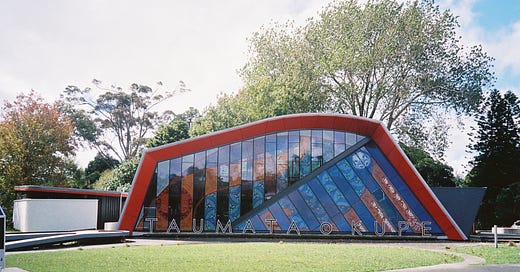Kitchen Conversations
How Indigenous communities worldwide champion resilience and community-building by safeguarding their foodways—my experience of He Whenua Rongo 2024 [Part 02].
This is the second part of my account of the He Whenua Rongo 2024 symposium, day two. To refresh your memory, He Whenua Rongo was a three-day activation event on the broad topic of Indigenous food sovereignty, organised by the Papawhakaritorito Charitable Trust, the Māori collective Ngā Toki Whakarururanga and the National Māori Organics Authority of Aotearoa, Te Waka Kai Ora.
Part one is available through the Kitchen Conversations email published in November. Both stories are substantial, and so published as a series, part of our Kitchen Conversations publishing schedule for October, November and December. Food-for-thoughts to start the new year!
Part two is about the afternoon session's speakers and all the wisdom we learned from them, each covering in their way the broad topic of how regionalised Indigenous cultural foodways are a significant path to global food security, moving away from capitalist economies, and the best approach to build climate change, food and community resilience.
The Afternoon–Another point of view on conservation, the truth about modern agriculture and the Indigenous organic agriculture movement
Lunch was provided at the event, and it was so luscious, to say the least. The food was flavoursome and beautiful. There is no better place than an event rooted in agroecology to be sure you will enjoy the food break. In retrospect, I regret not taking photos of the buffets. After recharging our energy and enjoying some rays of sunshine outside, we returned to the room.
Seeding Sovereignty with Dr Melanie Mark-Shadbolt
Dr Melanie Mark-Shadbolt is a social scientist, a former Deputy Secretary of Tūmatakōkiri (Māori Rights and Interest) for the Ministry of the Environment in Aotearoa, New Zealand, and the CE of Te Tira Whakamātaki, a Māori environmental not-for-profit organisation. Te Tira Whakamātaki seeks to empower and uplift Indigenous people and communities and re-establish their connection with Nature and their culture, leading the protection of Nature and sustaining biodiversity through mātauranga Māori [traditional Māori knowledge] and kaitiakitanga [process and practices of protecting and looking after the environment]. The organisation mobilises people through community engagement, research, education and advocacy work, including support for Māori-led research, decision-making, and policy change.
Melanie Mark-Shadbolt started her session by discussing conservation principles in Aotearoa, New Zealand. She laid out how current conservation and bio-protection policies in the country are deeply rooted in colonialism and are tools of colonialism. Government control over the management strategies of these environmental issues often ignores or goes against Indigenous knowledge and sovereignty, “causing more harm than good”.






